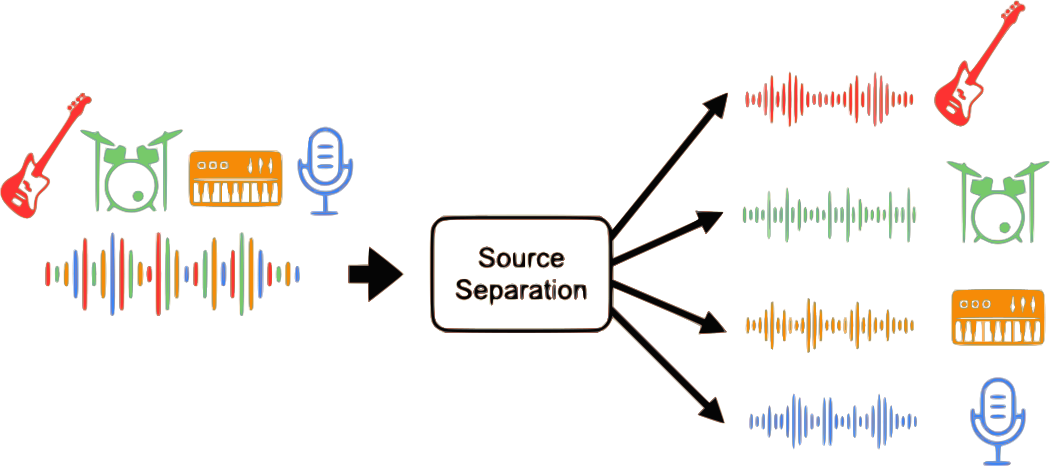A free client-side static website for music demixing (aka music source separation) using the AI model Open-Unmix (with UMX-L weights):

I transliterated the original PyTorch model Python code to C++ using Eigen. It compiles to WebAssembly with Emscripten. The UMX-L weights are quantized (mostly uint8, uint16 for the last 4 layers) and saved with the ggml binary file format. They are then gzipped. This reduces the 425 MB of UMX-L weights down to 45 MB, while achieving similar performance (verified empirically using BSS metrics).
This is based on umx.cpp, my other project. This repo focuses on the WASM and web aspects, while umx.cpp is more about maintaining 1:1 performance parity with the original Open-Unmix (supporting both umxhq and umxl).
- Implement demucs v4 (hybrid transformer,
htdemucs) and the 6-source (htdemucs_6s) variants
Clone the repo with submodules:
git clone --recurse-submodules https://github.com/sevagh/free-music-demixer
To generate a weights file with Python, first create a Python venv, then:
python -m pip install -r ./scripts/requirements.txt
python ./scripts/convert-pth-to-ggml.py --model=umxl ./ggml-umxl
gzip -k ./ggml-umxl/ggml-model-umxhl-u8.bin
Build for WebAssembly with Emscripten using emcmake:
mkdir -p build-wasm && cd build-wasm && emcmake cmake .. && make
The wav-file-encoder project has been vendored in; I manually compiled the Typescript file to Javascript with these commands:
npm install typescript
npx tsc --module es6 ../vendor/wav-file-encoder/src/WavFileEncoder.ts
MUSDB18-HQ test track 'Zeno - Signs':
'Zeno - Signs', fully segmented (60s) inference + wiener + streaming lstm:
vocals ==> SDR: 6.830 SIR: 16.421 ISR: 14.044 SAR: 7.104
drums ==> SDR: 7.425 SIR: 14.570 ISR: 12.062 SAR: 8.905
bass ==> SDR: 2.462 SIR: 4.859 ISR: 5.346 SAR: 3.566
other ==> SDR: 6.197 SIR: 9.437 ISR: 12.519 SAR: 7.627
'Zeno - Signs', unsegmented inference (crashes with large tracks) w/ streaming lstm + wiener:
vocals ==> SDR: 6.846 SIR: 16.382 ISR: 13.897 SAR: 7.024
drums ==> SDR: 7.679 SIR: 14.462 ISR: 12.606 SAR: 9.001
bass ==> SDR: 2.386 SIR: 4.504 ISR: 5.802 SAR: 3.731
other ==> SDR: 6.020 SIR: 9.854 ISR: 11.963 SAR: 7.472
Previous release results on 'Zeno - Signs' (no streaming LSTM, no Wiener filtering):
vocals ==> SDR: 6.550 SIR: 14.583 ISR: 13.820 SAR: 6.974
drums ==> SDR: 6.538 SIR: 11.209 ISR: 11.163 SAR: 8.317
bass ==> SDR: 1.646 SIR: 0.931 ISR: 5.261 SAR: 2.944
other ==> SDR: 5.190 SIR: 6.623 ISR: 10.221 SAR: 8.599
- Streaming UMX LSTM module for longer tracks with Demucs overlapping segment inference
Testing 'Georgia Wonder - Siren' (largest MUSDB track) for memory usage with 60s segments:
vocals ==> SDR: 5.858 SIR: 10.880 ISR: 14.336 SAR: 6.187
drums ==> SDR: 7.654 SIR: 14.933 ISR: 11.459 SAR: 8.466
bass ==> SDR: 7.256 SIR: 12.007 ISR: 10.743 SAR: 6.757
other ==> SDR: 4.699 SIR: 7.452 ISR: 9.142 SAR: 4.298
vs. pytorch inference (w/ wiener):
vocals ==> SDR: 5.899 SIR: 10.766 ISR: 14.348 SAR: 6.187
drums ==> SDR: 7.939 SIR: 14.676 ISR: 12.485 SAR: 8.383
bass ==> SDR: 7.576 SIR: 12.712 ISR: 11.188 SAR: 6.951
other ==> SDR: 4.624 SIR: 7.937 ISR: 8.845 SAR: 4.270